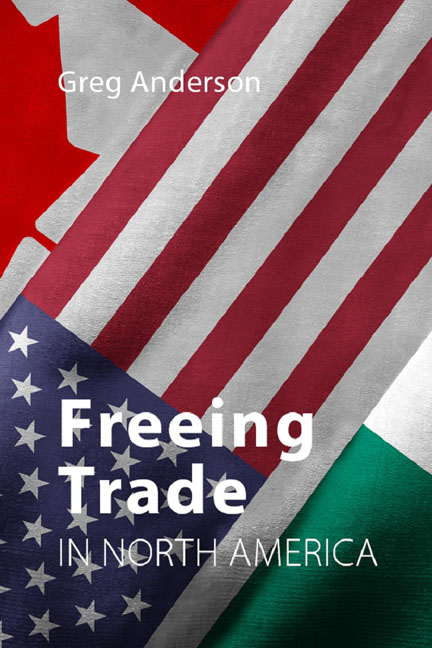Book contents
- Frontmatter
- Contents
- Introduction
- 1 The North American Idea
- 2 What the NAFTA is (and is not)
- 3 North America as Region
- 4 New Ground Broken and (Mixed?) Results
- 5 Much ado about Foreign Direct Investment
- 6 Governance in the NAFTA, or Lack Thereof?
- 7 Labour and the Environment
- 8 NAFTA 2.0: Did the Usmca Modernize Anything?
- Appendix 1 Spaghetti Bowl of Commitments by the 12 Trans-Pacific Partnership Signatories
- Appendix 2 US Trade in Goods and Services With NAFTA Partners, 1989–2017
- References
- Index
4 - New Ground Broken and (Mixed?) Results
Published online by Cambridge University Press: 24 August 2023
- Frontmatter
- Contents
- Introduction
- 1 The North American Idea
- 2 What the NAFTA is (and is not)
- 3 North America as Region
- 4 New Ground Broken and (Mixed?) Results
- 5 Much ado about Foreign Direct Investment
- 6 Governance in the NAFTA, or Lack Thereof?
- 7 Labour and the Environment
- 8 NAFTA 2.0: Did the Usmca Modernize Anything?
- Appendix 1 Spaghetti Bowl of Commitments by the 12 Trans-Pacific Partnership Signatories
- Appendix 2 US Trade in Goods and Services With NAFTA Partners, 1989–2017
- References
- Index
Summary
The NAFTA has assumed a larger-than-life persona during the course of its nearly three-decade-long existence. In its narrow economic persona, it is a shallow preferences agreement, with ambition restricted to the exchange of goods, services and investment. In its political persona, the NAFTA is the quintessential political football: kicked around by politicians and routinely invoked by people who have not read it as supporting their point of view.
In the NAFTA’s earliest days as a political football, proponents such as President George H. W. Bush claimed the NAFTA would generate countless US export jobs, solidify Mexico’s place as a well-governed consumer of those exports and drive a global effort to pave streets with gold. Critics, of course, thought the NAFTA was going to end civilized life as we knew it. There is not much gold pavement anywhere, and the debate about whether we are nearing the end of civilized life goes on. However, it was not as though the NAFTA lacked any ambition. Knitting three economies comprising US$8.4 trillion in 1994 was bound to generate plenty of political hyperbole. President Trump is not well known for offering evidence to support his assertion that the NAFTA is the “worst agreement ever negotiated”, but some factual latitude can be extended to the 45th president, in part because so much of the debate around the NAFTA has been devoid of real fact. The reality is that the set of measures upon which we can claim the NAFTA had a direct impact is fairly small, partly because of the relatively shallow stage of integration the NAFTA represents.
Politicians want to be able to claim that their economic initiatives have created jobs. Moreover, they and those who vote for them are not necessarily moved by abstract statistics about how many widgets cross the border. Consider, for example, the NAFTA Commission’s joint statement from April 2012, which reads, in part:
Since its entry into force in 1994, the North American Free Trade Agreement (NAFTA) has contributed to increased trade and investment between us and to greater economic competitiveness in each country.
- Type
- Chapter
- Information
- Freeing Trade in North America , pp. 61 - 80Publisher: Agenda PublishingPrint publication year: 2019

